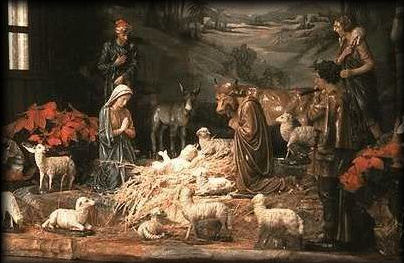The Christmas story has been retold so many times in sermons and hymns, in school plays and storybooks, that it has become a part of the national psyche. Every schoolchild knows that Mary and Joseph traveled to the little town of Bethlehem where there was no room at the inn. They sought shelter in a stable where Mary gave birth, and she laid the baby Jesus in a manger surrounded by oxen and donkeys. Shepherds came to adore him, and three wise men paid him homage, bearing gifts of gold, frankincense and myrrh. Soon after, the wicked king Herod sought to kill the new-born child, and Mary and Joseph fled with Jesus to Egypt to escape his wrath.
It is a heartwarming tale, and one that few Christians are inclined to question. Yet this story appears in none of the Gospels. It is a composite, a pastiche of clippings from Matthew and snippets from Luke. Anyone who troubles himself to read the nativity narratives of the two evangelists can plainly see that they are incompatible on fundamental points.
Matthew places the birth of Jesus during the reign of Herod the Great, a tributary to Rome who died in 4 B.C. Luke states that Jesus was born when Cyrenius was governor of Syria, and Palestine was under direct Roman rule — after Herod’s death, around 6 AD.
Saying nothing of a census, Matthew states simply that Jesus was born in Bethlehem and that the wise men came to “the house” where he was. The story of the stable and manger comes from Luke.
Matthew speaks of wise men following a star in the east but knows nothing of shepherds; Luke tells of shepherds, saying nothing of wise men.
Where Matthew describes the holy family fleeing from Herod soon after Jesus’ birth, Luke states that his parents took Jesus to the Temple in Jerusalem eight days later for his circumcision.
The discrepancies in Jesus’ birth date alone have confounded generations of scholars. Historians have diligently searched the archives for Roman census data and have scoured the records for mention of astrological portents — comets, supernovas, the conjunction of Jupiter and Saturn — that might resemble the mysterious star of the east.
The task of dating Jesus’ birth need not detain us here, yet it is vital in our quest to uncover the historical Jesus to understand the family conditions that molded his personality and shaped his world view. If Jesus truly were conceived by God and a virgin mother, as Luke and Matthew maintain, we would have little choice but to accept the Christian version of his life as written in the Gospels: The overriding influence in his development was his divine status. Were Jesus the natural son of Joseph, as many scholars have suggested, we could argue that he absorbed the same aspirations as most other Jews. But if he were the illegitimate son of Mary, as his detractors charged, we might conclude that Jesus was raised as a social outcast — putting his mission and his life in an entirely new light.
The logical place to commence our study is to review what Jesus said about himself. Unfortunately, there isn’t much to go on. In none of the sayings recorded by the Gospels and Apocryphal writings did Jesus discuss his birth directly. Although he may have referred to himself as the “Son of God” — a term that suggested a spiritual, not a biological kinship — he never mentioned his paternity.
The legitimacy of his birth apparently was not an issue during Jesus’ lifetime. The hostile Pharisees, whose stronghold was Jerusalem and the southern province of Judaea, apparently knew little about his personal background. “We don’t know where he comes from,” John quotes them as saying. Understandably so. Their contacts did not extend to the tiny provincial town of Nazareth in the northern province of Galilee. If there had been any tongue wagging in Nazareth about Jesus’ birth, the Pharisees would not have been privy to it. But it was general knowledge that Jesus hailed from Galilee — and it was precisely this point that the Pharisees seized upon. They argued that the Messiah would not come from Galilee: “Hath not the scriptures said that Christ cometh out of the seed of David, and out of the town of Bethlehem where David was born?”
Rebutting the popular opinion expressed by the Pharisees, Jesus asserted that the Messiah need not be descended from King David. In the Psalms, he noted, David referred to God as “Lord.” If David paid obeisance to God as his superior, Jesus asked, how could God (or his agent, the Messiah) be David’s son?
Logical, perhaps. But why did the scribes raise the question and why did Jesus bother to counter it? Because Jesus could not trace his lineage back to David. Had he been able to document a Davidic ancestry, his opponents would not have attacked his humble Galilean origins. Had he been descended from David, he would not have taken issue with the popular belief.
Extrapolating from this exchange – the one instance in which Jesus was recorded commenting upon his ancestry — we can safely say that he was not descended from David. As a corollary, we can assert that Jesus was not the biological son of Joseph who, according to both Luke and Matthew, was of David’s lineage. Both evangelists attempted to trace Jesus’ Davidic descent through Joseph, and then undercut their own tortuous arguments by denying Joseph’s paternity. Matthew put it this way: Joseph was “the husband of Mary, of whom was born Jesus.” Luke was equally awkward, referring to Jesus, who was “as was supposed” the son of Joseph. Read more.



